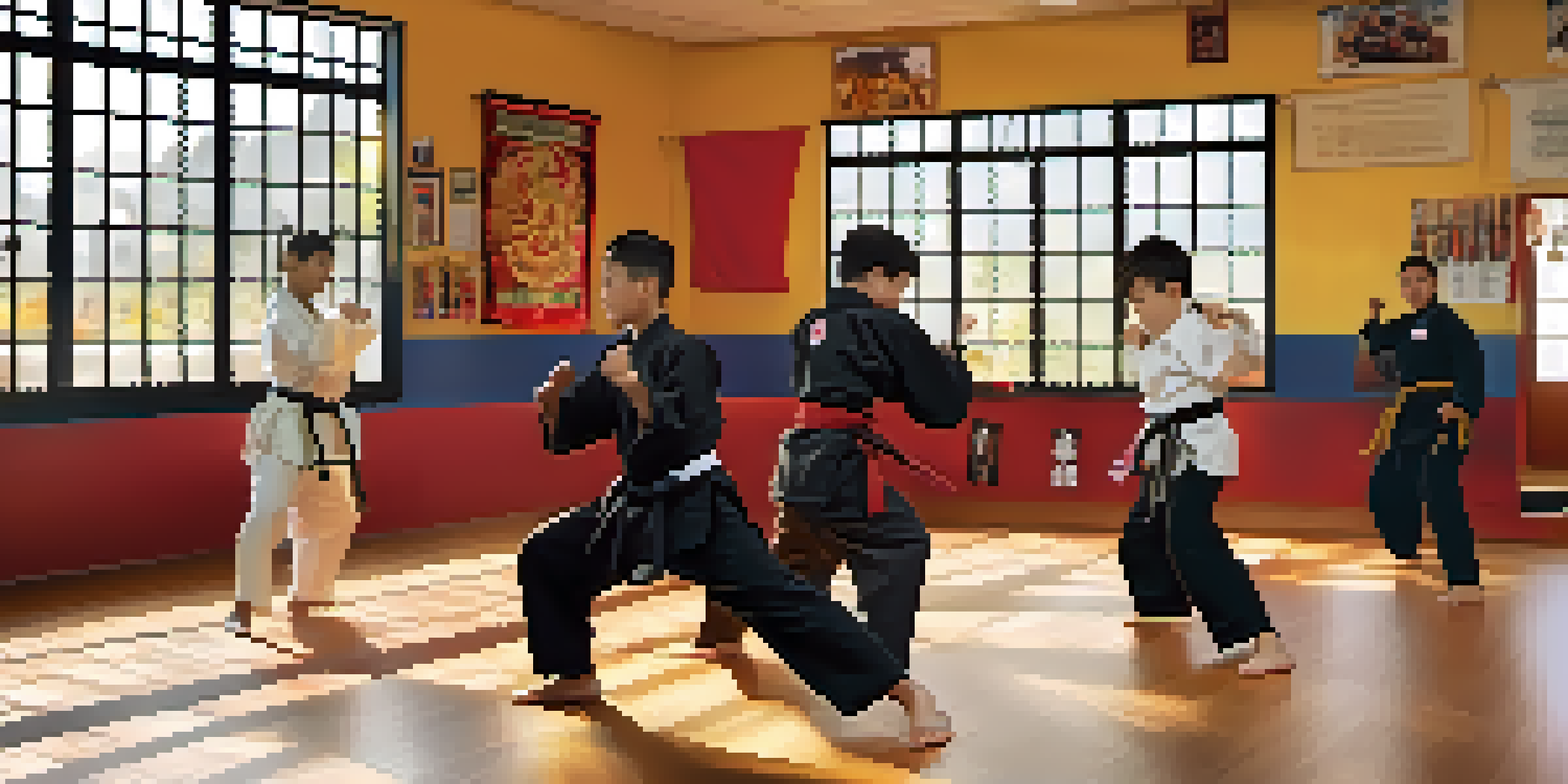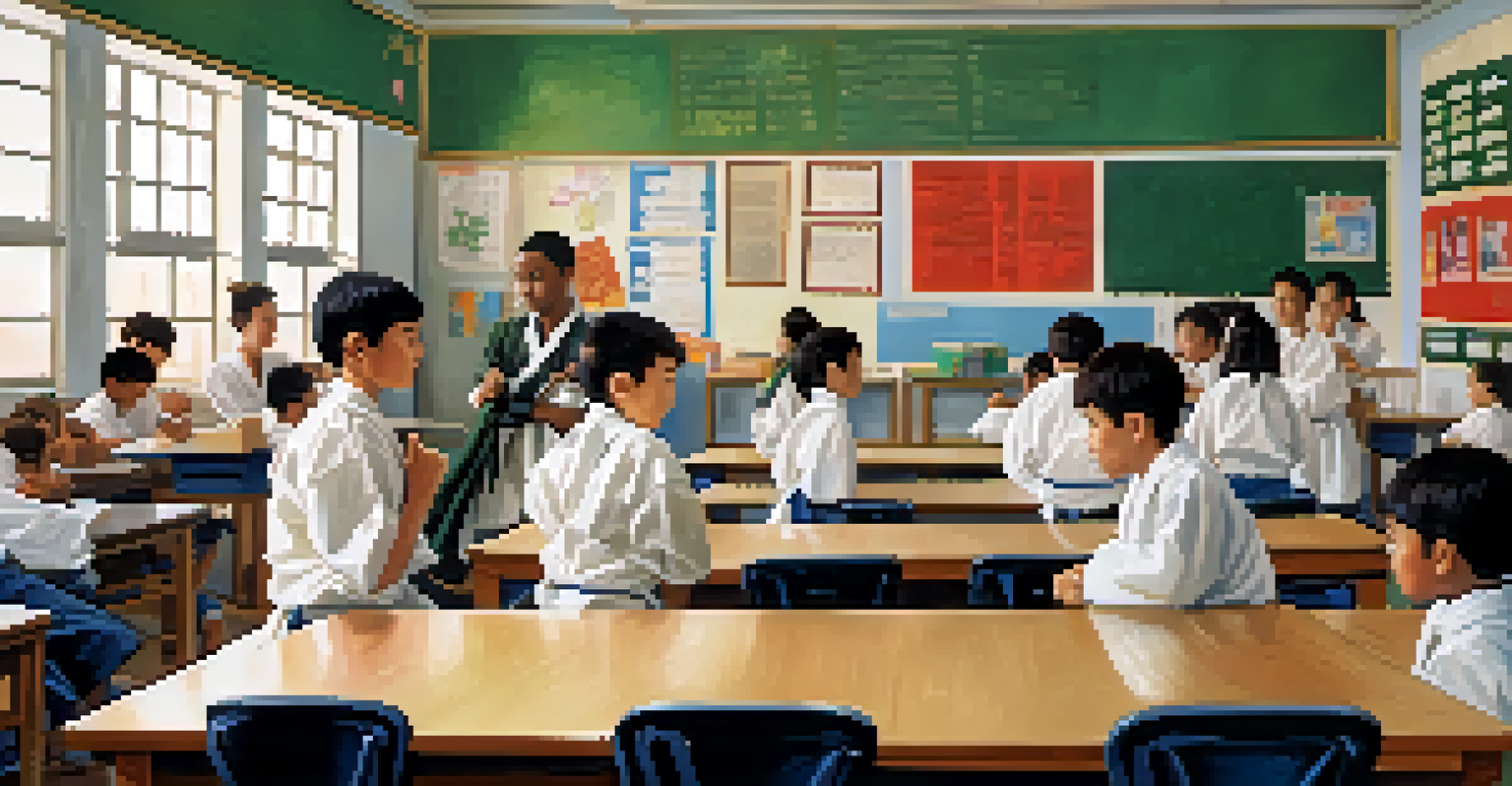Martial Arts as a Tool for Enhancing Student Focus in Class

Understanding Focus: Why It Matters in Education
Focus is the cornerstone of effective learning, acting as a bridge between information intake and knowledge retention. In a world filled with distractions, students often struggle to maintain their concentration during lessons. This inability to focus not only affects their academic performance but can also impact their self-esteem and motivation.
The mind is everything. What you think you become.
When students are unable to concentrate, they miss critical concepts and fall behind their peers. This gap can create a cycle of frustration, leading to disengagement from the learning process. Teachers and parents alike are constantly searching for strategies to enhance focus in the classroom.
One promising approach that has emerged is the incorporation of martial arts as a means to sharpen attention and enhance overall academic performance. By blending physical activity with mental discipline, martial arts can offer a unique solution to the focus dilemma.
How Martial Arts Cultivates Mental Discipline
Martial arts training is grounded in principles of discipline and respect, which are crucial for developing focus. Each technique requires concentration, allowing students to practice mindfulness as they engage their bodies and minds. This dual engagement creates a powerful learning experience, promoting better focus in all areas of life.

Instructors often emphasize the importance of being present and fully engaged during training sessions. This practice translates into the classroom, where students learn to apply the same level of attention to their studies. The repetitive nature of martial arts drills reinforces mental discipline, making it easier for students to stay focused on their academic tasks.
Focus Enhances Learning Outcomes
Maintaining focus is crucial for students to effectively absorb and retain information, ultimately improving their academic performance.
Moreover, the structured environment of martial arts classes helps students understand the value of commitment and perseverance. Over time, they cultivate a stronger ability to concentrate and resist distractions, setting the stage for improved learning outcomes.
Physical Activity and Its Impact on Focus
Engaging in physical activity has long been shown to have positive effects on cognitive function. Martial arts, in particular, combines aerobic exercise with mental challenges that stimulate brain activity. This interplay not only enhances physical fitness but also sharpens focus and attention.
It is not the strongest of the species that survive, nor the most intelligent, but the one most responsive to change.
When students participate in martial arts, their bodies release endorphins, naturally improving mood and reducing stress. A calmer mind is more capable of focusing on academic tasks, making martial arts a beneficial complement to traditional education. Furthermore, the focus required during training can carry over into the classroom, leading to better engagement with lessons.
Incorporating regular physical activity through martial arts can, therefore, rejuvenate students mentally and physically, paving the way for a more focused approach to learning.
Building Confidence Through Martial Arts
Confidence plays a significant role in a student's ability to focus. When students believe in their abilities, they are more likely to engage actively in classroom discussions and activities. Martial arts fosters this confidence through skill mastery and achievement, giving students a sense of accomplishment.
As students progress through different belts and techniques, they experience a boost in self-esteem. This newfound confidence translates into the classroom, where students are more willing to participate and take risks with their learning. They become more focused, knowing they possess the skills to succeed.
Martial Arts Boosts Concentration
Incorporating martial arts into education fosters mental discipline and mindfulness, helping students improve their focus both in and out of the classroom.
By creating a supportive environment that celebrates growth and achievement, martial arts nurtures self-confidence, which is essential for maintaining focus in academic settings.
Mindfulness and Its Role in Enhancing Focus
Mindfulness is the practice of being present in the moment, a skill that martial arts inherently teaches. Students learn to concentrate on their movements and surroundings, fostering a deep sense of awareness. This awareness extends beyond martial arts, helping students stay present in their academic pursuits.
Practicing mindfulness through martial arts can help students develop better emotional regulation, reducing anxiety and distractions. When students are less anxious, they can focus more easily on the tasks at hand. This calm state of mind is crucial for effective learning and retention of information.
As students learn to embrace mindfulness, they develop techniques that can be applied in the classroom, such as deep breathing and visualization. These strategies, rooted in martial arts, empower students to enhance their focus and connection to learning.
Social Skills Development Through Martial Arts
Martial arts is often practiced in a group setting, promoting social interaction and teamwork. These interactions help students develop essential communication skills and foster relationships with peers. A supportive social environment can significantly enhance a student's ability to focus and engage in the classroom.
As students learn to work together in martial arts, they build camaraderie and trust, which can lead to a more positive learning atmosphere. When students feel connected to their peers, they are more likely to participate actively, ask questions, and focus on the material being taught.
Confidence Drives Student Engagement
As martial arts builds self-confidence in students, they become more active participants in their learning, enhancing their ability to concentrate.
Moreover, the respectful culture of martial arts instills values such as patience and empathy. These social skills not only enhance focus but also contribute to a more harmonious classroom environment, further supporting student engagement.
Integrating Martial Arts into School Programs
Many schools are beginning to recognize the benefits of integrating martial arts into their physical education programs. By offering martial arts classes, schools can provide students with tools to improve focus, discipline, and physical fitness. This integration can lead to a more holistic educational experience.
Schools that incorporate martial arts often see an increase in student engagement and a decrease in behavioral issues. When students are involved in physical activities that promote focus, they are less likely to disrupt classes. This positive shift can create a more conducive learning environment for everyone.

By advocating for martial arts in schools, educators can embrace an innovative approach to enhancing student focus and overall well-being. It’s a win-win for students, teachers, and the entire educational community.